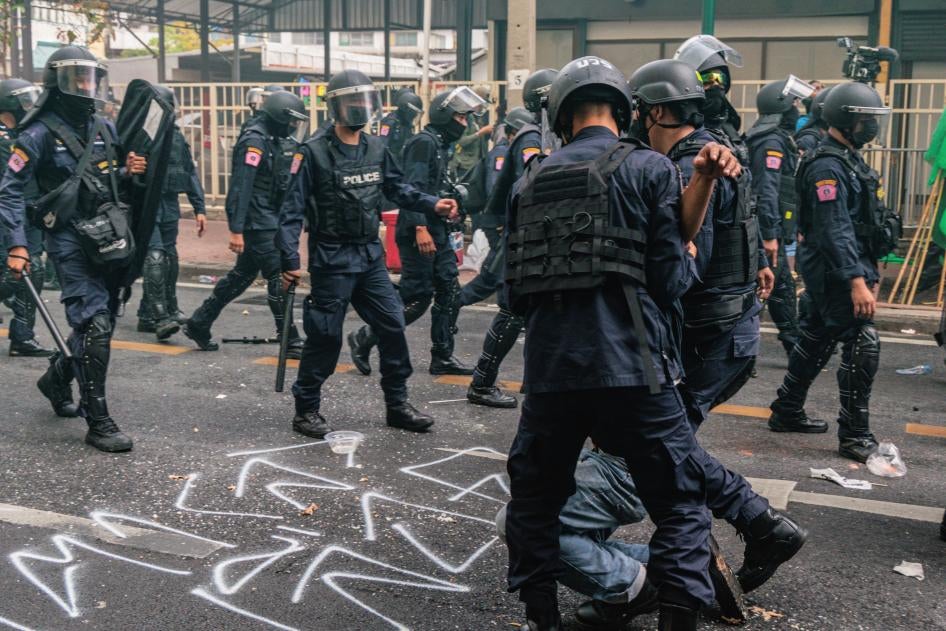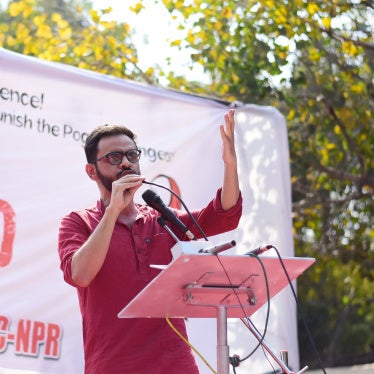(New York) – Thai riot police used apparently excessive force to disperse demonstrators protesting against the Asia-Pacific Economic Cooperation (APEC) summit in Bangkok on November 18, 2022, Human Rights Watch said today. Prime Minister Gen. Prayut Chan-ocha should promptly order an impartial investigation into alleged beatings and the use of rubber bullets that harmed protesters, and take appropriate action against those responsible.
About 200 marchers from the Citizens Stop Apec 2022 coalition – a loose network of democracy, environmental, livelihood, and grassroots groups – tried to march to the Queen Sirikit National Convention Center, the site of the two-day summit. After 9 a.m., when they were approximately seven kilometers away, the marchers were blocked by police barricades and tried to push through them. Riot police then charged and used batons to beat the demonstrators, including a Buddhist monk, kicked and punched those already in police custody, and fired rubber bullets from close range.
“The Thai government’s use of force against demonstrators tarnished its hosting of the APEC summit and spotlighted its intolerance of dissenting voices,” said Elaine Pearson, Asia director at Human Rights Watch. “Foreign delegates in attendance got to see first-hand how Prime Minister Prayut’s government doesn’t shy away from violently repressing largely peaceful protests in Thailand.”
Human Rights Watch interviewed demonstrators and witnesses, and reviewed photographs and videos from journalists. Police shot Phayu Bunsophon, from the Dao Din democracy group, in the right eye with a rubber bullet, permanently blinding him. The police shot a member of the group Assembly of the Poor in the stomach at close range with a rubber bullet as he was lying on the ground after a police officer kicked him in the groin.
Riot police also attacked journalists at the scene. Police hit Sutthipath Kanittakul of The Matter, who wore a media armband issued by the Thai Journalists Association, with a baton and kicked him in the head as he was broadcasting scenes from the crowd dispersal. Riot police punched and kicked Waranyu Khongsathittum of The Isaan Record, then arrested him. Riot police threw a glass bottle at a group of photographers, which hit Chalinee Thirasupa, a freelance photojournalist, in the right eye, injuring her. The Thai Journalists Association, The Matter, and The Isaan Record issued statements calling for the attacks to be fully investigated and those responsible brought to justice.
Police arrested a total of 25 people. All were released on bail on November 18 and 19 with bail conditions that they must not take part in rallies or persuade others to rally or cause social unrest.
The right of peaceful assembly is enshrined in article 21 of the International Covenant on Civil and Political Rights (ICCPR), to which Thailand is a state party, and Section 44 of Thailand’s constitution. International human rights standards set out requirements for government officials and their agents to protect and facilitate peaceful demonstrations and marches.
Under the United Nations Basic Principles on the Use of Force and Firearms by Law Enforcement Officials and other international human rights standards, law enforcement may only use force when strictly necessary and to the extent required to achieve a legitimate policing objective. In carrying out their duties, law enforcement officials should to the extent possible use non-violent means before resorting to the use of force. So-called kinetic impact projectiles, such as rubber bullets, should only be used to address an imminent threat of injury to either a member of the public or a law enforcement official.
In November 2020, the spokesperson for UN Secretary-General António Guterres expressed concern about the use of force by Thai security forces: “It is disturbing to see the repeated use of less lethal weapons against peaceful protesters, including water cannons,” the spokesman said. “It’s very important that the government of Thailand refrain from the use of force and ensures the full protection of all people in Thailand who are exercising a fundamental peaceful right to protest.”
In the ensuing two years, the Thai authorities have failed to heed the secretary-general’s concerns, Human Rights Watch said. Police have repeatedly abused demonstrators with impunity.
“The Thai government should stop violently cracking down on demonstrations, and investigate and appropriately prosecute those responsible for abuses, regardless of their position or rank,” Pearson said. “Concerned governments and the United Nations should publicly urge the Thai government to end its political repression and instead engage in dialogue on democratic reforms.”









